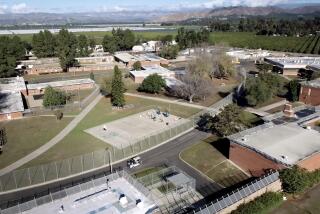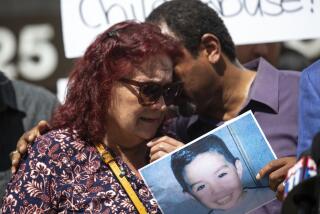Supreme Court justices doubt need for warrant in child abuse cases
The Supreme Court justices, hearing arguments in a closely watched case involving child abuse investigations at schools, took sharp exception Tuesday to the notion that a search warrant or a parent’s consent was required before a child could be questioned at school by a child-care worker or a police officer.
Each year, state and local agencies investigate more than 3 million claims of child abuse or neglect. In about 1 in 4 cases, the investigators decide that some abuse took place.
The high court has not ruled on whether the Constitution puts limits on investigations at schools. However, the U.S. 9th Circuit Court of Appeals in San Francisco got the attention of child-care workers nationwide when it ruled that investigators usually needed a search warrant before taking a child out of class for questioning.
Oregon’s attorney general and an Obama administration lawyer urged the justices to overturn the ruling.
Child-protection workers would “face an enormous burden” if they had to get a warrant before speaking to a child at school, said John Kroger, Oregon’s top lawyer. “It is impossible to establish probable cause to get a warrant without first speaking to the child, because the child is usually the only witness.”
The case began when Nimrod Greene, an Oregon man, was arrested on charges that he drunkenly fondled a boy. The boy’s parents suspected Greene had also abused his own children. Bob Camreta, a child-care worker, went to a school to speak to Greene’s 9-year-old daughter. He was accompanied by a police officer.
Greene pleaded guilty to lesser charges, and his wife, Sarah, sued the two investigators. In a 2-1 decision, the 9th Circuit Court of Appeals ruled that the “removal and examination” of the child “violated Sarah and the girl’s constitutional rights.”
Supreme Court Justice Sonia Sotomayor said she was astonished that this was called an unreasonable seizure.
“Mere removal from the classroom is a seizure?” she asked. Justice Stephen G. Breyer voiced the same surprise. Unless the 9th Circuit ruling is overturned, said Justice Samuel A. Alito Jr., child-care workers across the country could face damage suits for taking children out of class for an interview.
By the hour’s end, the justices sounded as though they would vote to set aside the 9th Circuit’s ruling.
More to Read
Start your day right
Sign up for Essential California for news, features and recommendations from the L.A. Times and beyond in your inbox six days a week.
You may occasionally receive promotional content from the Los Angeles Times.







